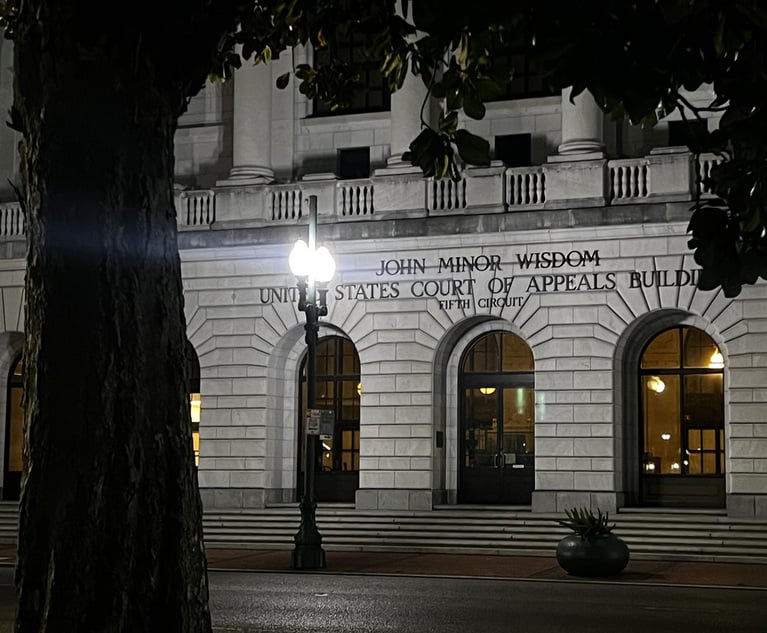Features

Lateral Partner Integration Processes, Challenges and Solutions
How can law firms improve success with retaining lateral hires? Tips and shared advice from legal integration professionals.
Features

Best Practices for AI Compliance and Security
Creating new forms of artificial intelligence may be a great leap forward, but controlling them can be a stumbling block for businesses and government agencies alike.
Features

A Look At Partial Deal In Music Publishers’ Lyrics Infringement Suit Against AI Company Anthropic
A partial agreement that music publishers reached with Anthropic PBC requires the Amazon-backed artificial intelligence company to implement “guardrails” around its use of copyrighted song lyrics to train its flagship product Claude.
Features

Pragmatic Post-Purdue Approach Behind NJ’s Rise As Strong Venue Option for Chapter 11 Cases
The Chapter 11 filing statistics clearly show that New Jersey has emerged as a strong venue option. The question is why? The answer, we submit, is consistency and pragmatism.
Features

Revolutionizing Workplace Design: A Perspective from Gray Reed’s Facilities Leader
Across the industry, law firms are reevaluating their office spaces to adapt to hybrid work models, prioritize collaboration, and enhance employee experience. Trends such as flexible seating, technology-driven planning, and the creation of multifunctional spaces are shaping the future of law firm offices.
Features

Gen Z’s Tech Familiarity Seen As Asset for Law Firm Retention and Recruiting
With a greater number of older attorneys expected to age out of the profession and succession planning earning an increased focus in the legal world, law firms will need to ramp up talent recruitment and retention, and observers envision Gen Z attorneys, with their heightened familiarity with technology, as a particularly critical asset.
Features

Fifth Circuit Weighs In On Constitutionality of the Corporate Transparency Act
Events have moved swiftly and symptomatically lately in the Fifth Circuit. Long known as the circuit with the greatest skepticism of federal regulation of the economy, it turned its attention to the Corporate Transparency Act, which requires non-exempt companies to report the identity of their beneficial owners.
Columns & Departments
Fresh Filings
Notable recent court filings in entertainment law.
Features

The 2025 Patent Landscape Begins With Many Pieces of Proposed Legislation
The U.S. patent legal landscape in 2025 is poised for change. The incoming presidential administration is coupled with interim changes in leadership at the USPTO after Kathi Vidal’s departure, and several newly vacant, fillable commissioner seat openings at the ITC. Amid that backdrop, many pieces of proposed patent legislation are pending in Congress which could further — or possibly stifle — modern trends in American patent law, and could alter our innovation landscape for years to come. This article surveys that pending patent legislation.
Features

3 Factors for Successful Hourly Rate Adjustments
Beyond alternative fee arrangements, firms should consider hourly rate adjustments with three factors in mind: psychological pricing, client feedback and growth. All three are vital for aligning fees with perceived value while supporting the firm’s financial health.
Need Help?
- Prefer an IP authenticated environment? Request a transition or call 800-756-8993.
- Need other assistance? email Customer Service or call 1-877-256-2472.
MOST POPULAR STORIES
- Challenges In Being a Pro Sports General CounselBeing a general counsel for a professional sports team is a coveted gig, but it's also a job with unique challenges, potential ethical minefields and scandals lurking around the front office, field, stadium and elsewhere.Read More ›
- Use of Deferred Prosecution Agreements In White Collar InvestigationsThis article discusses the practical and policy reasons for the use of DPAs and NPAs in white-collar criminal investigations, and considers the NDAA's new reporting provision and its relationship with other efforts to enhance transparency in DOJ decision-making.Read More ›
- The DOJ's Corporate Enforcement Policy: One Year LaterThe DOJ's Criminal Division issued three declinations since the issuance of the revised CEP a year ago. Review of these cases gives insight into DOJ's implementation of the new policy in practice.Read More ›
- The DOJ's New Parameters for Evaluating Corporate Compliance ProgramsThe parameters set forth in the DOJ's memorandum have implications not only for the government's evaluation of compliance programs in the context of criminal charging decisions, but also for how defense counsel structure their conference-room advocacy seeking declinations or lesser sanctions in both criminal and civil investigations.Read More ›
- Practice Tip: The Earning Capacity of Business OwnersThe owner of a business can claim as lost earning capacity in a personal-injury action only the working time lost due to injuries and harm to future earning capacity, not the business' alleged profits in perpetuity.Read More ›
